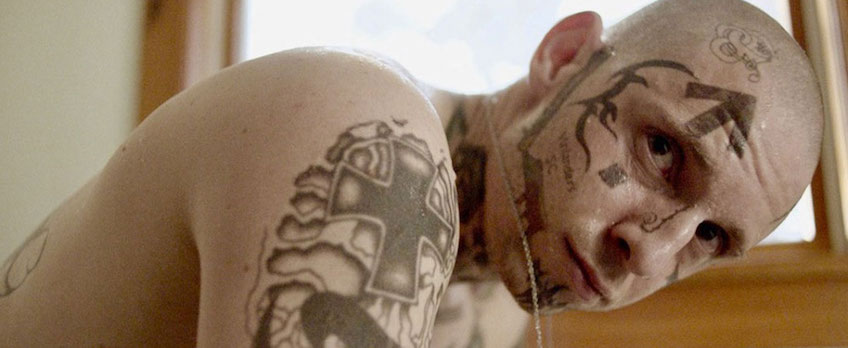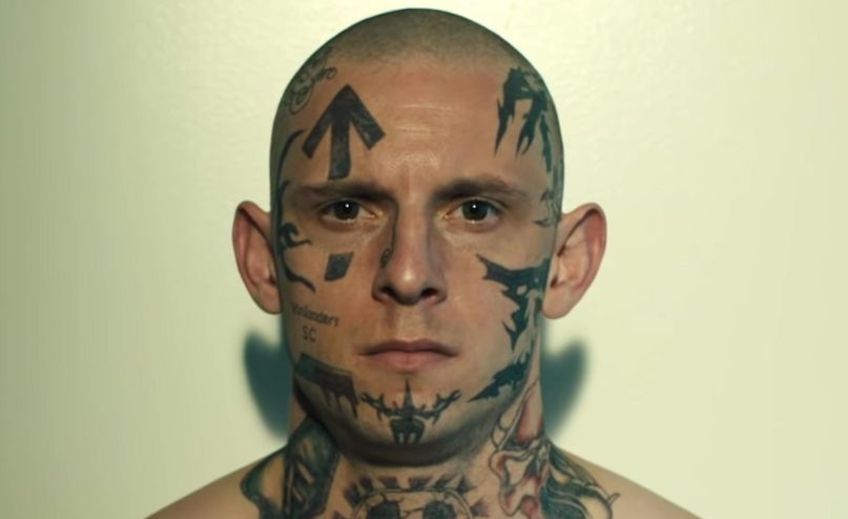Interested in writing for our blog? Send your pitches to editor@miff.com.au.
Skin and the Allure of ‘Feel-Good’ Race Movies

A lot of embarrassing American crap has emerged from the #resistance to the Trump presidency, from ‘covfefe’ jokes becoming the height of comedy to some inexplicably positive reviews for Adam McKay’s Vice. But the increased appetite for unchallenging dramas about Racists Turning Good has got to be one of the most grating cultural trends to reach our shores.
It’s not difficult to understand the appeal of optimistic movies like The Best of Enemies or Green Book, which posit that even the worst of us can open up our hearts and change, and that hate need not divide us. But these dramas about reformed racists often offer viewers an easy way out. The fact that these movies are typically period pieces allows us to dissociate from the heinous bigotry on display, and reflect upon how far we’ve come instead of being forced to think about what hasn’t changed. Earlier this year, mild controversy transpired over Green Book’s protagonist, Nick Vallelonga (Viggo Mortensen), who disposes of a glass that his black handyman touches – but such shocking moments are in fact vital to the appeal of these films, providing us an opportunity to gasp before disapprovingly tutting under our breaths at how backwards and uncivilised he is, unlike us. Vallelonga, like other sympathetic racists in cinema, is also little more than a thinly-sketched caricature, making his considerable change of heart feel superficial and almost unearned. Broad characterisations aren’t inherently a bad quality, and are absolutely par for the course for feel-good Hollywood films. But it begs the question: why make feel-good Hollywood films about racists?
At a glance, Guy Nattiv’s feature film Skin (currently showing at MIFF) offers a more compelling approach to similar subject matter. Rather than offering the safety of the past, it’s a contemporary biopic that explores a considerably less relatable protagonist: a violent skinhead, Bryon Widner (Jamie Bell, still kinda hot), dipped head to toe in ink. And with its nasty, visceral depiction of violence (inflicted by Bryon himself) in the film’s opening minutes, it initially appears poised to confront audiences, rather than comfort them. But disappointingly, the film’s flashes of brutality and its oh-so-gritty tone only exist to stylistically spice up a film which appears somewhat reluctant to engage with the fascinating transformation at its heart. For a film called Skin, it’s not unreasonable to expect that there might be something more below the surface.
Despite lacking psychological insight into its main character, Skin actually succeeds in demonstrating the allure of skinhead gangs, and the difficulty of extricating one’s self from such tightly wound organisations. While the real Bryon Widner co-founded the Vinlanders Social Group – the white supremacist group featured in the film – Skin situates fictional couple ‘Hammer’ (Bill Camp) and Shareen Krager (Vera Farmiga) at the head of the organisation. They essentially act as surrogate parents who prey on deprived young men, luring them with the promise of food, shelter and family. When Bryon attempts to distance himself from the organisation, the family hounds him, invading his new home before viciously harassing him. Throughout the film, we’re treated to the presence of Daryle Jenkins (Mike Colter), a real-life antifa activist who runs an organisation that monitors the far-right and reforms neo-Nazis. When he reaches out to Bryon, Daryle reminds us that thousands of marginalised people find themselves gradually indoctrinated into white supremacist groups before starting to feel alienated, staying for reasons of safety rather than whole-hearted allegiance.

From Guy Nattiv's Skin
However, the film doesn’t fully illuminate the difference between Bryon and millions of other desperate, disadvantaged men preyed upon by the far right – the ones who don’t join skinhead gangs and smother every inch of their skin in white supremacist symbols – although Bryon’s dissociation from his racist beliefs is presented from the very start as being wildly ambivalent about his place in the Vinlanders and the violence he commits against minorities. This portrayal is somewhat at odds with his real-life counterpart; as previously mentioned, Bryon Widner was a proud racist who co-founded the very gang he eventually ran away from. While his character’s uncertainty inspires more sympathy for him and is indicative of many people who reluctantly find themselves ensnared within skinhead gangs, the decision the elide this significant fact in favour of storytelling cohesion is disappointing. A terrific film could have been made from this true story: one that incisively scrutinises how people can unlearn hate. But Bryon’s diluted characterisation in Skin prevents us from seeing him as the truly hateful man he was, and we are robbed of any greater understanding of his psychological and ideological transformation.
Towards the end, Skin threatens to tug at the ambiguity of its protagonist’s growth, emphasising the extent to which violence has become a fundamental part of Bryon’s personality, threatening to spill over into his newfound life. As his tattoos are removed, Bryon is left wondering: ‘What if I take all this stuff off and I’m still a piece of shit?’. But then the credits roll and we’re treated to real-life photos of Bryon, with the accompanying text confirming that he’s successfully carved out a respectable life for himself. The audience can breathe a sigh of relief.
As an entire package, Skin is designed to instil hope about our potential to unify across political divides. Like Green Book and The Best of Enemies, it flirts with the wretched depths of its despicable characters on the road to redemption, presenting a straightforward narrative that recoils from moral complexities. It is yet another feel-good film about race.
Hollywood produces these films because there is an audience for them, especially now. They’re consoling and competently manufactured, and there’s certainly nothing wrong with wanting to escape the unrelenting awfulness of the world for a couple of hours. But the popularity of these films in Australia happens to correlate with a general apathy towards racism in this country, even amongst many people who consider themselves to be paragons of tolerance and all that is Woke. The last thing we need are films that flatter liberal attitudes (yes, you are on the right side of history!) while sidestepping the complexities of grappling with a serious, but not insurmountable issue.
It’s also deeply frustrating that films like Skin depict racists simply as an ‘other’, relegated to the past or to the fringes of society in gangs. It distracts from the reality that dangerous, hateful nationalists exist within the respectable spheres of Australian society, and that their talking points have permeated the mainstream.
Skin is not a poorly made film, nor is it a poorly intentioned one – but it risks inviting complacency when lazy liberal audiences ought to be pulling their heads out of the sand.